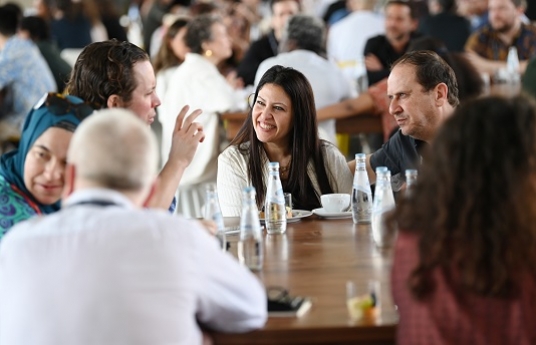صناع أفلام عرب ودوليون يشيدون بدور ملتقى قمرة السينمائي 2023 في دعمه مسيرتهم المهنية
13 مارس 2023

الدوحة، قطر، 13 مارس 2023: سلّط صناع الأفلام العالميين الذي تشارك أعمالهم في ملتقى قمرة السينمائي 2023، الحاضنة السنوية من تنظيم مؤسسة الدوحة للأفلام، الضوء على دور الملتقى كحدث فريد من نوعه مؤكدين على أهميته لعالمنا اليوم لبناء أصوات جديدة في السينما، كما أشادوا بدعم مؤسسة الدوحة للأفلام في تعزيز مصداقية أفلامهم.
يشارك في ملتقى قمرة السينمائي 44 فيلماً روائياً ووثائقياً طويلاً، بالإضافة إلى أفلام قصيرة ومسلسلات من 23 بلداً، وذلك ضمن مهمة مؤسسة الدوحة للأفلام لدعم مسيرة صانعي الأفلام الصاعدين وتمكينهم من إنجاز مشاريعهم وعرضها إلى الجماهير في جميع أنحاء العالم.
تتميز مشاريع قمرة هذا العام بمواضيعها القوية والأصلية والإبداعية. أحد هذه المشاريع هو مسلسل الويب “ميارا” (المغرب، قطر)، من إخراج طلال سلهمي وجواد لحلو، تدور أحداثه حول امرأة شابة بربرية، تكتشف أن والدها المقتول كان ملك الفايكنج الذي سقط في القرن الثامن في شمال إفريقيا.
وقال المخرجان إن الفيلم هو أيضًا استكشاف للهوية والجذور ويهدف إلى تبديد فكرة أنه من الصعب صنع مسلسلات مركبة بطموح وحجم كبير في العالم العربي. ولفت طلال إلى أنّ “إعادة إنشاء هذه الحقبة عملية مضنية، ولهذا السبب يعد التمويل أمرًا أساسيًا لتحقيق ذلك، لقد صورنا النسخة التجريبية، والتشجيع الذي نتلقاه من قمرة استثنائي بالفعل. نأمل أن نتعامل مع المزيد من المنتجين وهذه المنصة توفر لنا هذه الفرصة”.
فيلم “كواليس“ (المغرب، تونس، بلجيكا، فرنسا) من إخراج عفاف بن محمود وخليل بنكيران، يدور حول عايدة التي تعمل ضمن فرقة للرقص المعاصر تجول في المغرب. تقول عفاف أنها ارتكزت على خبرتها في الفنون الأدائية والمسرح لتصنع هذا الفيلم، مشيرة إلى أن التمويل شكل تحدياً لها. “اليوم نحن على وشك أن ننجز الفيلم نهائياً، وهناك جمهور نخبوي يعشق الفن والموسيقى والمسرح، وسيكون الفيلم ملائماً لهم لأنه يتمحور حول هذا الموضوع”.
وقال خليل بنكيران بأن قمرة يجمع نخبة المختصين في صناعة السينما للإشراف على المشاريع الناشئة، مضيفاً “لا يمكنك إيجاد هذا الحشد في مكان واحد في أي مكان آخر في العالم. بالنسبة لنا، نحن على وشك إنجاز الفيلم، لكن نحتاج إلى التمويل والتوزيع، ومع وجود الخبراء هنا ومشاهدة جزء من الفيلم ستكون هناك فرصة لنقل مشروعنا إلى المرحلة التالية”.
أماندا نيل إيو، مخرجة فيلم “خطوط النمر“ (ماليزيا، تايوان، سنغافورة، فرنسا، ألمانيا، هولندا، أندونيسيا، قطر)، تستكشف فكرة التمكين من زاوية شخصية حيث يدور الفيلم حول فتاة تكتشف سراً مرعباً حول حالتها الجسدية. وتقول بأن قمرة منحها منصة للتواصل مع الموزعين ومديري المهرجانات والعديد من العاملين في المجال السينمائي. وأضافت: “فيلمي يدور حول النضوج والتغير الجسدي، واسم الفيلم مستوحى من النمر في ماليزيا، لأنه جميل وقوي، واستخدمته كرمز تعبيري عن قوة التمكين”.
لينا سويلم، مخرجة فيلم “باي باي طبريا“ (فرنسا، فلسطين، بلجيكا، قطر) تتبع رحلة والدتها، الممثلة الفلسطينية المعروفة هيام عباس التي تركت قريتها دير حنّا في الجليل منذ 30 عاماً واتبعت حلمها في التمثيل في فرنسا. وقالت: “إنها قصة عن قوة العلاقات بين النساء، الذكريات التي يحملنها على الرغم من الصعاب التي يواجهنها. في فلسطين، يمكن أن تكون هذه الصعاب هي المنفى، في أماكن أخرى يمكن أن تكون العادات والتقاليد. فيلمي يظهر كيف يمكن للمرأة إيجاد مكان لها في العالم والعديد من الناس يمكن أن يعيشوا في هذا الظرف”.
المخرجة ليلى عباس من فلسطين، تقدم قصة ممتعة في فيلمها “شكراً لأنك من عائلتنا“ (ألمانيا، فلسطين، قطر). الفيلم حالياً في مرحلة الإنتاج ويدور حول قوانين الإرث في الدول العربية والإسلامية ومدى ظلمها للمرأة. تقارب ليلى الموضوع من خلال أختيها اللتين واجهتا هذا النظام بعد وفاة والدهما، بهدف مشاركة ورثته. وأضافت: “تم التعامل مع الفيلم بحساسية وطريقة ساخرة حيث تم استلهامه من أحداث حقيقية حدثت في أسرتي”. حصلت المخرجة على تمويل مبدئي من مؤسسة الدوحة للأفلام لإنجاز فيلمها، وقالت: “عندما توفر لك مؤسسة مرموقة وذات مصداقية هذا الدعم، فإنها تدفع جهات أخرى للقيام بذلك أيضاً. هذا هو الجميل فيما تقوم به. إنها تفتح أبواباً لصناع الأفلام مثلنا”.